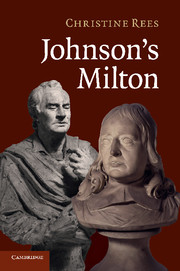Book contents
- Frontmatter
- Contents
- Acknowledgements
- List of abbreviations
- Introduction: Johnson and Milton
- PART I JOHNSON THE READER/WRITER: APPROPRIATING MILTON'S TEXTS
- 1 Summoning Milton's ghost: Miltonic allusion in the periodical essays
- 2 ‘No Miltonian Fire’? Miltonic allusion in Johnson's poetry
- 3 Rasselas: a rewriting of Paradise Lost?
- 4 ‘Licence they mean when they cry liberty’: the 1770s tracts
- PART II JOHNSON THE CRITIC: ASSESSING MILTON'S ACHIEVEMENT
- PART III JOHNSON THE BIOGRAPHER: CONSTRUCTING MILTON'S CHARACTER
- Notes
- Select bibliography
- Index
3 - Rasselas: a rewriting of Paradise Lost?
Published online by Cambridge University Press: 05 October 2010
- Frontmatter
- Contents
- Acknowledgements
- List of abbreviations
- Introduction: Johnson and Milton
- PART I JOHNSON THE READER/WRITER: APPROPRIATING MILTON'S TEXTS
- 1 Summoning Milton's ghost: Miltonic allusion in the periodical essays
- 2 ‘No Miltonian Fire’? Miltonic allusion in Johnson's poetry
- 3 Rasselas: a rewriting of Paradise Lost?
- 4 ‘Licence they mean when they cry liberty’: the 1770s tracts
- PART II JOHNSON THE CRITIC: ASSESSING MILTON'S ACHIEVEMENT
- PART III JOHNSON THE BIOGRAPHER: CONSTRUCTING MILTON'S CHARACTER
- Notes
- Select bibliography
- Index
Summary
Readers of Rasselas have long regarded it as the quintessential Johnson text, the distillation of his philosophy of life. According to James L. Clifford, one great modern Johnsonian speaking about another, ‘David Nichol Smith used to say that Rasselas was the touchstone by which you could determine whether you could ever be a true Johnsonian or not.’ While scholars have excavated sources for the Abyssinian and Egyptian setting of Johnson's oriental tale, the common readers close to Johnson's heart have generally brought their experience of his own writings to bear. If the fashion (originating in the eighteenth century) for regarding it ‘as a more enlarged and more deeply philosophical’ prose equivalent of The Vanity of Human Wishes has faded a little, the periodical essays continue to be mined for parallels, and the Dictionary is a constant resource for linguistic usage. The notes of modern Rasselas editors bulge with citations from Johnson's other works. But this practice simply conforms to a familiar critical expectation of intertextuality, that the texts of a mature and established writer will converse with, or even interpenetrate, each other, that the best commentary on a text is often the writer's own. It is an exogamous marriage with other texts that introduces more difficult questions of interpretation, since the degree of affinity, and how the relationship develops, does not start from a given kinship.
The differences between Paradise Lost and Rasselas seem absurdly obvious: differences of scale, of medium, of genre, of outlook, of history.
- Type
- Chapter
- Information
- Johnson's Milton , pp. 58 - 81Publisher: Cambridge University PressPrint publication year: 2010



